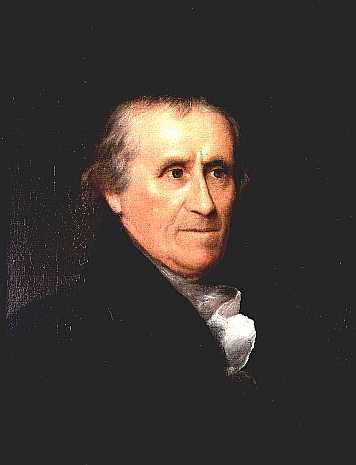Benjamin Waterhouse
Benjamin Waterhouse (March 4, 1754 – October 2, 1846) was an influential American physician, professor, and co-founder of Harvard Medical School. He is best known for being the first doctor to test the smallpox vaccine in the United States, significantly contributing to the practice of vaccination.
Early Life and Education[edit | edit source]
Benjamin Waterhouse was born in Newport, Rhode Island. He pursued his early education at the College of Rhode Island (now Brown University), where he developed an interest in medicine. Waterhouse continued his medical studies in London and Edinburgh, where he was exposed to the latest medical knowledge and practices of the time. He received his medical degree from the University of Leiden in the Netherlands in 1780.
Career[edit | edit source]
Upon returning to the United States, Waterhouse settled in Cambridge, Massachusetts, and began his medical practice. In 1782, he played a pivotal role in the establishment of the Medical School at Harvard University, where he served as the first Hersey Professor of the Theory and Practice of Physic.
Waterhouse's most notable contribution to medicine came in 1800 when he learned of Edward Jenner's work with cowpox as a means of preventing smallpox. Waterhouse obtained the vaccine matter and conducted the first vaccinations in the United States on his own children, demonstrating the vaccine's effectiveness. He became a staunch advocate for vaccination, facing both support and opposition from the medical community and the public.
Throughout his career, Waterhouse published extensively on various medical topics, including the benefits of vaccination, and engaged in public health efforts. He was a founding member of the Massachusetts Medical Society and contributed to the establishment of several medical and scientific institutions.
Later Life and Legacy[edit | edit source]
Despite his contributions to medicine and public health, Waterhouse faced professional controversies and challenges, particularly in his later years. He was eventually removed from his position at Harvard in 1812, due in part to conflicts with colleagues and his outspoken nature.
Benjamin Waterhouse died in 1846 in Cambridge, Massachusetts. His pioneering work in vaccination left a lasting impact on public health and the prevention of infectious diseases. Waterhouse's advocacy and implementation of the smallpox vaccine marked a significant advancement in medical science and the practice of immunization.
See Also[edit | edit source]
Benjamin Waterhouse[edit | edit source]
Search WikiMD
Ad.Tired of being Overweight? Try W8MD's physician weight loss program.
Semaglutide (Ozempic / Wegovy and Tirzepatide (Mounjaro / Zepbound) available.
Advertise on WikiMD
|
WikiMD's Wellness Encyclopedia |
| Let Food Be Thy Medicine Medicine Thy Food - Hippocrates |
Translate this page: - East Asian
中文,
日本,
한국어,
South Asian
हिन्दी,
தமிழ்,
తెలుగు,
Urdu,
ಕನ್ನಡ,
Southeast Asian
Indonesian,
Vietnamese,
Thai,
မြန်မာဘာသာ,
বাংলা
European
español,
Deutsch,
français,
Greek,
português do Brasil,
polski,
română,
русский,
Nederlands,
norsk,
svenska,
suomi,
Italian
Middle Eastern & African
عربى,
Turkish,
Persian,
Hebrew,
Afrikaans,
isiZulu,
Kiswahili,
Other
Bulgarian,
Hungarian,
Czech,
Swedish,
മലയാളം,
मराठी,
ਪੰਜਾਬੀ,
ગુજરાતી,
Portuguese,
Ukrainian
Medical Disclaimer: WikiMD is not a substitute for professional medical advice. The information on WikiMD is provided as an information resource only, may be incorrect, outdated or misleading, and is not to be used or relied on for any diagnostic or treatment purposes. Please consult your health care provider before making any healthcare decisions or for guidance about a specific medical condition. WikiMD expressly disclaims responsibility, and shall have no liability, for any damages, loss, injury, or liability whatsoever suffered as a result of your reliance on the information contained in this site. By visiting this site you agree to the foregoing terms and conditions, which may from time to time be changed or supplemented by WikiMD. If you do not agree to the foregoing terms and conditions, you should not enter or use this site. See full disclaimer.
Credits:Most images are courtesy of Wikimedia commons, and templates, categories Wikipedia, licensed under CC BY SA or similar.
Contributors: Prab R. Tumpati, MD




